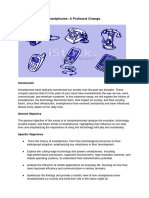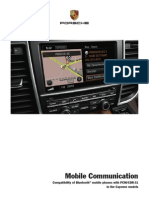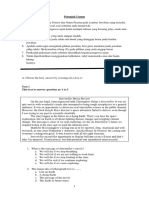**Mobile Phones: A Revolutionary Force in Modern Society**
Mobile phones have transcended their initial role as mere communication devices to become a central
fixture in modern life. These portable gadgets have revolutionized the way we interact, access
information, conduct business, and entertain ourselves. While they offer numerous benefits, they also
pose certain challenges. This essay explores the transformative impact of mobile phones, weighing their
advantages against the potential drawbacks to provide a balanced perspective on their role in
contemporary society.
**Historical Context and Evolution**
The journey of mobile phones began in the early 20th century with the invention of wireless
communication technology. The first commercial mobile phone, the Motorola DynaTAC 8000X, was
released in 1983. It was bulky, expensive, and had limited functionality. However, rapid technological
advancements have since transformed mobile phones into sleek, multifunctional devices. Today’s
smartphones are equipped with powerful processors, high-resolution cameras, and a plethora of
applications that cater to virtually every aspect of daily life.
**Advantages of Mobile Phones**
One of the primary advantages of mobile phones is enhanced communication. They allow instant
connectivity through calls, texts, and various internet-based services, shrinking the world into a global
village. Social media platforms, messaging apps, and video conferencing tools enable people to maintain
relationships across vast distances, fostering both personal and professional connections.
Mobile phones also serve as essential tools for information access and dissemination. With the internet
at their fingertips, users can stay updated with global news, conduct research, and acquire new skills.
Educational apps and online courses have democratized learning, providing opportunities for self-
improvement and career advancement.
Moreover, mobile phones have revolutionized the business landscape. They facilitate remote work,
allowing employees to stay productive outside the traditional office environment. Mobile banking and e-
commerce platforms have made financial transactions and shopping more convenient, driving economic
growth and innovation.
�In the realm of entertainment, mobile phones offer a diverse range of options, from streaming movies
and music to playing games and reading e-books. They provide on-the-go entertainment, catering to the
varied preferences of users.
**Challenges and Concerns**
Despite their numerous benefits, mobile phones also pose several challenges. One significant concern is
the impact on social interactions. Excessive use of mobile phones can lead to reduced face-to-face
communication and a sense of isolation. People may become overly reliant on virtual interactions, which
can affect the quality of real-world relationships.
Another critical issue is the potential for addiction. The constant notifications and the lure of social
media can lead to compulsive usage, detracting from productivity and well-being. This phenomenon,
often referred to as "smartphone addiction," is linked to various mental health issues, including anxiety,
depression, and sleep disorders.
Privacy and security are additional concerns. Mobile phones store vast amounts of personal data, making
them attractive targets for cybercriminals. Data breaches and unauthorized access to sensitive
information pose significant risks to individuals and organizations alike.
Furthermore, the environmental impact of mobile phones cannot be overlooked. The production and
disposal of these devices contribute to electronic waste, which has detrimental effects on the
environment. The extraction of raw materials for manufacturing and the energy consumption during
production also have ecological implications.
**Balancing Benefits and Drawbacks**
To harness the benefits of mobile phones while mitigating their drawbacks, it is crucial to adopt balanced
usage patterns. Users should strive for mindful consumption, setting boundaries to prevent excessive use
and prioritizing face-to-face interactions. Digital literacy programs can educate people about the
responsible use of mobile phones, emphasizing the importance of privacy and security measures.
Additionally, the tech industry must continue to innovate in sustainable practices, such as developing
eco-friendly materials and promoting recycling programs. Policymakers can play a role by implementing
regulations that protect consumer data and encourage environmentally responsible production.
�**Conclusion**
Mobile phones are undoubtedly a revolutionary force in modern society, offering unprecedented
convenience and connectivity. While they present certain challenges, a thoughtful and balanced
approach can help maximize their benefits and minimize potential harms. As technology continues to
evolve, the role of mobile phones in our lives will likely expand, making it essential to navigate their use
wisely and responsibly.





















































































